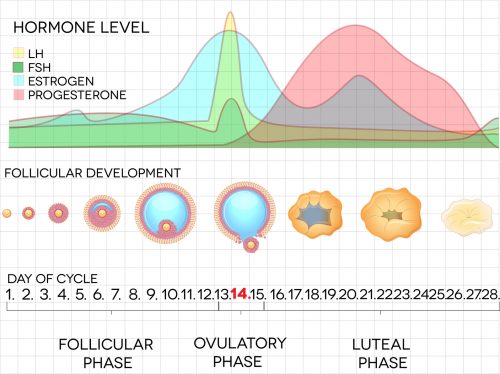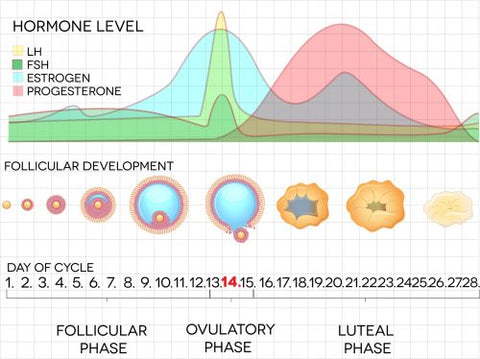
Does a Short Menstrual Cycle Make Getting Pregnant Harder?
What is a Short Menstrual Cycle
If you have been trying to get pregnant for a while, you know that everyone says that the “normal” cycle length is 28 days. When you calculate your cycle length and see that it is less than that magical 28 days, you start to worry.
“Will I have problems getting pregnant with my 21 (or 22 or 23) day cycle?” “Is there something wrong with me?” Both questions that haunt you. The good news is, in most cases, you should still be able to get pregnant, and there is nothing wrong with you.
If you have a cycle length that is 21 to 25 days long, and your period arrives on schedule every month, then you would have a regular short menstrual cycle. Cycles shorter than 21 days could indicate a hormone imbalance or other medical issue. You’d want to discuss this with your doctor.
Article Contents:
– Menstrual Cycle Stages
– When Having a Short Menstrual Cycle May Be A Problem
– Best Ways to Figure Out When You Ovulate
– When Will I Ovulate?
– Lengthening Short Menstrual Cycles
– Getting Pregnant With A Short Menstrual Cycle

Menstrual Cycle Phases
Your menstrual cycle is made up of 4 different sections:
- Your period/menstruation
- The follicular phase
- Ovulation
- The Luteal Phase
A woman’s menstrual cycle starts on the first day of her period, which is when her body sheds the uterine lining and unfertilized egg from the previous cycle. Normal period bleeding length is usually between 2 – 7 days and varies from woman to woman. Some women get confused and say their menstrual cycle length is how long they bleed during their period. This is not the case.
The follicular phase is when the follicles in the ovary mature. A follicle is a fluid-filled sac that contains an immature egg.
Ovulation is when a mature follicle burst, sending the egg out into a fallopian tube. Fertilization can occur now if sperm is waiting. After 24 hours, the egg starts disintegrating if conception has not happened.
The luteal phase is from right after ovulation to right before your period starts. This phase usually lasts for about 14 days, but 10 to 14 days could be regular for you. Your luteal phase length is the number of days between when you ovulate and when your period starts.
When Having a Short Menstrual Cycle May Be A Problem
If your monthly cycle lengths vary more than a day or two or don’t arrive every month, then you may have a hormonal imbalance. The hormonal imbalance can make it more difficult for you to get pregnant. When a woman’s cycle is irregular, she has a difficult time anticipating when she is ovulating, so she cannot estimate her fertile days.
If your period lasts 2 or 3 days and is very light, it could indicate that you have an issue with your luteal phase. A short menstrual cycle with short light period shows that you have a hormone imbalance as well.
Best Ways to Figure Out When You Ovulate
Ovulation predictor tests are probably the best option. They are inexpensive and easy to use. Once you use them for two months in a row, you will have a better idea when you ovulate. This method is not as concise as BBT charting though. A positive result on your ovulation test means ovulation should occur in 24 – 36 hours. If you have a regular short cycle, your luteal phase will be around 14 days. A 23-day cycle with a 14-day luteal phase would mean you would ovulate around day 9 of your menstrual cycle.
You can also chart your basal body temperature, but you have to be committed to this method. You will have to take your temperature every morning before you get out of bed and chart your results. BBT charting gives you A LOT of valuable information, but you have to be patient. Charting for several months will let you see when you ovulate (based on a small temperature increase) and how long your luteal phase is.
When Will I Ovulate?
The guestimates here are based on the assumption that you have a 14-day luteal phase.
21 Day Cycle – You should ovulate around day 7 of your menstrual cycle.
22 Day Cycle – You should ovulate around day 8 of your menstrual cycle.
23 Day Cycle – You should ovulate around day 9 of your menstrual cycle.
24 Day Cycle – You should ovulate around day 10 of your menstrual cycle.
25 Day Cycle – You should ovulate around day 11 of your menstrual cycle.
26 Day Cycle – You should ovulate around day 12 of your menstrual cycle.
27 Day Cycle – You should ovulate around day 13 of your menstrual cycle.
A woman can be considered fertile for 5 or 6 days before she ovulates. If you have a 21-day cycle, and your period lasts five days, having sex while still on your period could result in you getting pregnant. Sperm can survive up to 5 days after ejaculation and don’t have a problem traveling in menstrual blood.
Lengthening Short Menstrual Cycles
Women who have very short cycles may have fertility issues. Your hormones run the show when you are trying to get pregnant. When they are out of balance, the processes that need to happen during each stage of your cycle may not occur as they should.
Not all short cycles need lengthening though. If you have a regularly occurring period and a luteal phase is close to 14 days, leave your short cycle alone. Adding a supplement could disrupt a short cycle that is otherwise hormonally okay.
If your period doesn’t come regularly or if you discovered that your luteal phase is shorter than it should be, vitex may be an excellent supplement to try. Supplements that contain Vitex can be beneficial in lengthening your cycle and promoting regular ovulation. Vitex encourages the proper balance of estrogen and progesterone. Estrogen helps ensure ovulation happens and progesterone helps the uterus form a thick endometrial lining. A thick uterine lining provides a supportive environment for a fertilized egg. If you have light short periods, chances are your uterine lining is too thin, which makes sustaining a pregnancy more difficult.
Another sign of hormone imbalance is the lack of egg white cervical mucus. You should see this consistency close to ovulation. If you don’t, your hormones could be off. A gentle fertility detox can help promote hormone balance and increase your fertile egg white cervical mucus.
If you are worried that your short cycles are responsible for your inability to conceive, you should see your OB/GYN to have your hormones tested. From there, you can discuss options with your doctor to create more hormonal balance throughout her cycle.
Getting Pregnant with a Short Cycle
For hormonally balanced women, having sex around ovulation is the key to getting pregnant. Sperm can survive up to 5 days after ejaculation. If you have unprotected sex four days before ovulation, the sperm may be alive and waiting for when your egg is released. Use ovulation tests to pinpoint when you are going to ovulate and plan accordingly. Good Luck!
References:
“Bleeding Disorders in Women.” Centers for Disease Control and Prevention, Centers for Disease Control and Prevention, 28 Aug. 2015, www.cdc.gov/ncbddd/blooddisorders/women/menorrhagia.html.
Dasharathy SS, Mumford SL, Pollack AZ, et al. Menstrual Bleeding Patterns Among Regularly Menstruating Women. American Journal of Epidemiology. 2012;175(6):536-545. doi:10.1093/aje/kwr356.
https://www.ncbi.nlm.nih.gov/pmc/articles/PMC3299419/
“Menstrual Cycle: What's Normal, What's Not.” Mayo Clinic, Mayo Foundation for Medical Education and Research, 11 May 2016, www.mayoclinic.org/healthy-lifestyle/womens-health/in-depth/menstrual-cycle/art-20047186.
Reed BG, Carr BR. The Normal Menstrual Cycle and the Control of Ovulation. [Updated 2015 May 22]. In: De Groot LJ, Chrousos G, Dungan K, et al., editors. Endotext [Internet]. South Dartmouth (MA): MDText.com, Inc.; 2000-. Available from: https://www.ncbi.nlm.nih.gov/books/NBK279054/
Tags:
Getting Pregnant
Quick links
Search
Contact Us
Shipping Information
Helpful Info
Terms of Service
Privacy Policy
Do not sell my personal information
Contact us
About us
BabyHopes.com is a family owned and operated business, opened in January 2001. We have been serving the trying to conceive community for over 20 years.
